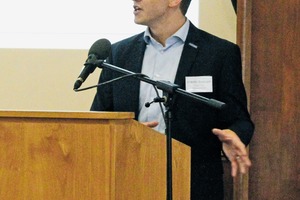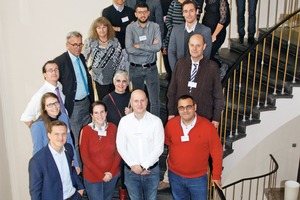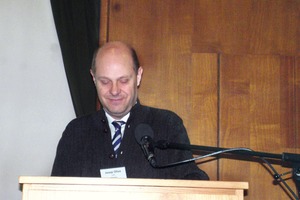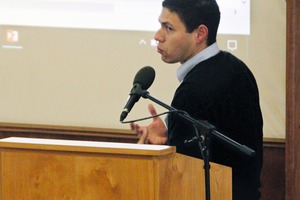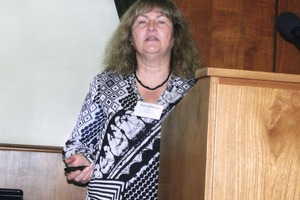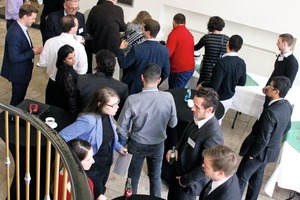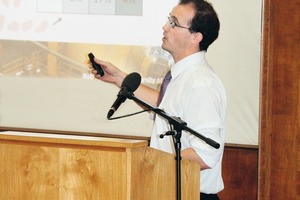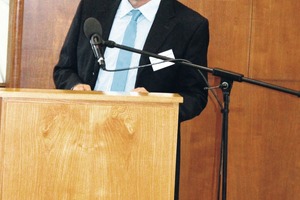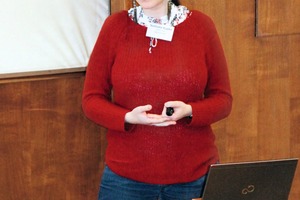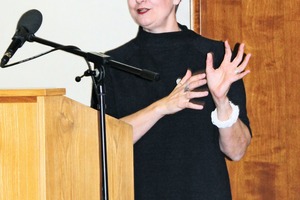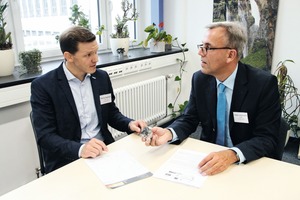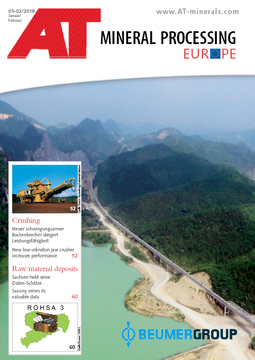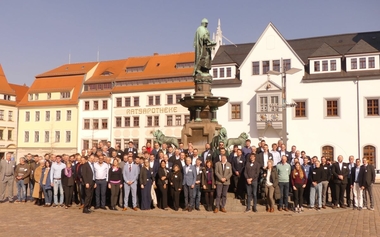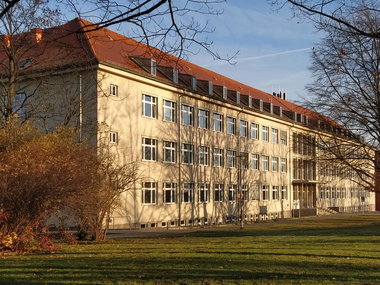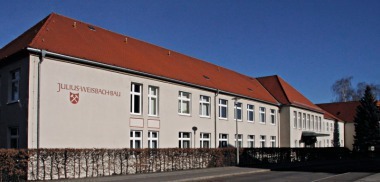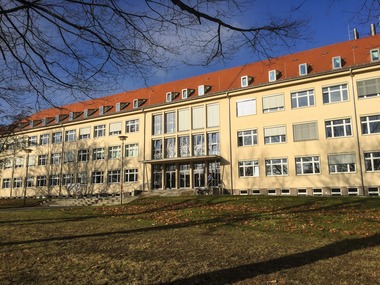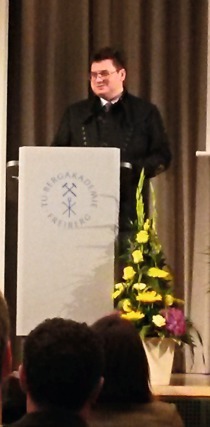OptimOre Symposium in Freiberg/Saxony
On 7 November 2017, the eve of the major conference “Mineral Processing and Recycling” organized by the Gesellschaft für Verfahrenstechnik UVR-FIA e.V. Freiberg, the Helmholtz Institute Freiberg for Resource Technology (HIF) in collaboration with the Freiberg University of Mining and Technology (TU BAF) arranged a symposium on a no less important topic. The title of the event already reveals that it was about the optimization of ore beneficiation, especially for tungsten and tantalum ores. Dr.-Ing. Martin Rudolph, HIF, who also moderated the event, was able to welcome more than 50 attendees.
OptimOre is a three-year EU research project initiated in December 2014 on the optimization of beneficiation processes for the strategically important raw materials tungsten and tantalum. It is funded by the European Commission within the framework of the Horizon 2020 programme. The goal is, based on cooperation between leading European research institutes and with the support of industry partners, to create a network through which Europe’s dependence on foreign supplies of the above-mentioned metals can be successfully reduced.
During the event, speakers from the participating research institutes – Universitat Politècnica de Catalunya (UPC/Spain, Project Coordinator), Universidad de Oviedo (UniOvi/Spain), Chalmers University of Technology Gothenburg (CUTG/Schweden), Camborne School of Mines / University of Exeter (CSM/Great Britain), Freiberg University of Mining and Technology (TU BAF/Germany) and Helmholtz Centre Dresden Rossendorf / Helmholtz Institute Freiberg for Resource Technology (HIF/Germany) along with Interkonsult Ltd. (IK/Great Britain) and EDMA Innova S.L. (EDMA/Spain) – presented their research findings and the activities they have undertaken within the scope of the OptimOre project. Accordingly, the programme of the event was divided into different work focuses.
In his introduction to the topics, Prof. Josep Oliva Moncunill (UPC) emphasized the importance of optimizing all processing steps, starting crushing to flotation and other separation techniques. As he explained, that would not be possible, however, without improved modelling and the creation of an integrated simulation model. The evaluation of the latter must ultimately be performed in industrial scale processing plants. Dr Mauricio Zapateiro (EDMA) reported on the requirements and development of the simulation software necessary for this purpose – starting from process modelling, through all individual components and systems and their integration to validation and quality control.
The state of the art in the beneficiation of W and Ta ores was presented by Prof. Juan María Menéndez Aguado (UniOvi). Prof. Pura Alfonso Abella (UPC) explained the mineralogical characterization of appropriate ores, for example from the Penouta deposit in Spain. Prof. Magnus Bengtsson (CUTG) reported on the up to 25-% improvement in efficiency at a reference plant near Gothenburg based on dynamic process modelling and a new simulation model for coarse comminution. Eduard Guasch and Hernan Anticoi (UPC) presented a simulation model for fine grinding (ball und high-pressure roller mills) developed by them, in which both dry and wet grinding is simulated. The tests were conducted on laboratory and pilot scale. Good agreement between model and laboratory results was demonstrated.
The work focuses in the afternoon session were gravity separation (Dr Rob Fitzpatrick, CSM), magnetic separation (Prof. Holger Lieberwirth, TU BAF) and flotation (Nathalie Kupka, HIF). All three papers addressed the modelling of these processing steps with the goal of process optimization. After this, Dr Mauricio Zapateiro (EDMA) demonstrated the potential of simulation software in which all individual results of the different work packages can be brought together as variable parameters. The hard and software are integrated in the pilot plant developed within the framework of the project to make reliable forecasts with regard to capacity, product quality, energy and water consumption. The symposium came to a close with observations on system integration by Debi Maskell-Graham (IK) and conclusions drawn from the presented results.
To summarize, the work groups were satisfied with the development progress, although further research work was necessary to realize optimum tungsten/tantalum ore beneficiation in Europe. After the symposium, the attendees were given the opportunity to visit the HIF and the Institute of Mineral Processing Machinery at TU BAF. But before that, the editors of AT MINERAL PROCESSING took the opportunity to talk to the two hosts of the event, Dr Martin Rudolph and Prof. Dr Holger Lieberwirth.
AT: What was the motivation to hold this symposium?
DR. RUDOLPH: Having started on the three-year OptimOre project on 1 December 2014, we have now reached the final phase. However, the project has just been extended by another three months -to the end of February 2018. And within the framework of the EU-supported project we are, of course, obliged to report on our research findings and present these to the public. Insofar, the idea for this event was already part of the project.
PROF. LIEBERWIRTH: As the “Mineral Processing and Recycling” conference is taking place here at the Institute over the next two days, which Gesellschaft für Verfahrenstechnik UVR-FIA e. V Freiberg is organizing in cooperation with HIF, this date was convenient for the presentation of the various OptimOre work packages of all partners taking part in the project.
AT: Are other events planned for the presentation of the research findings?
DR. RUDOLPH: The symposium in Freiberg, at which the individual project partners are presenting their respective work focuses in short talks. It is the kick-off for several similar events. The next two events – in January 2018 in England and in Gothenburg – are planned as workshops to engage in more intensive discussion with the guests. In February 2018 the closing event will be held in Barcelona, during which the attendees can view and experience the pilot plant configured as part of the project actually in operation.
AT: To which potential attendees are the events directed?
PROF. LIEBERWIRTH: We are primarily addressing representatives from industry: mining companies, plant engineering companies, engineers and process technicians working in consulting functions, but also supervisory authority and financial institutions. Basically, all sectors are represented that can make a contribution within the framework of future mining activities, or have an interest in the extraction of raw materials.
AT: Will there be a follow-on project?
DR. RUDOLPH: No direct successor project is planned together with the institutes taking part in OptimOre. But certainly, the individual cooperation partners will continue their research on optimization of the respective processing steps. At HIF, we are essentially working on flotation, and the results from our field of work as well as the results of our project partners in OptimOre will certainly flow into future research projects. And naturally there are overlaps with other funded projects, not only within the framework of Horizon 2020.
PROF. LIEBERWIRTH: Here in Germany, the Ministry of Education and Research (BMBF) has launched, for example, the r4 funding initiative for the supply of economically strategic raw materials. This includes the AFK project for the development of new strategies for the processing of fine-grained complex ores from German deposits, in which the HIF, TU BAF as well as UVR-FIA are involved. Things are moving and we are confident that also in the future it will be possible to extract raw materials at competitive prices in Germany.

